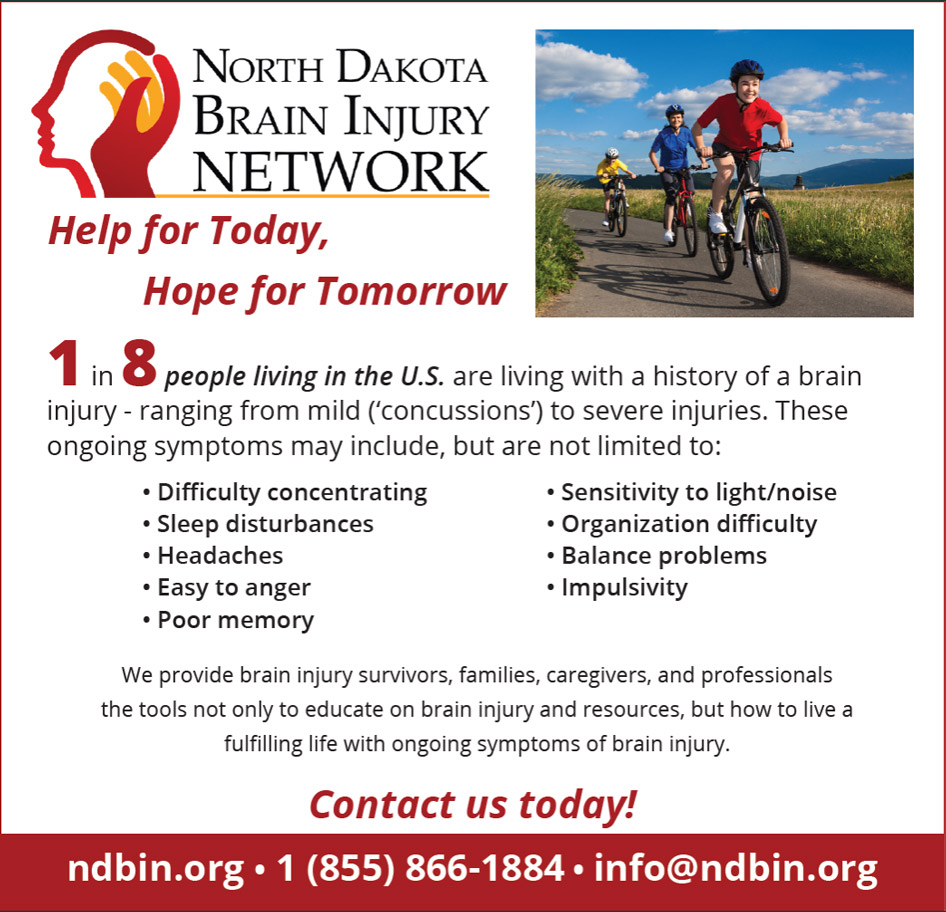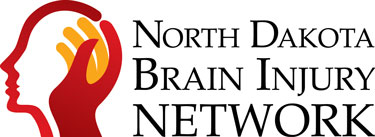NDBIN Newsletter – Fall 2024
Youth Football and Brain Injury
With the fall upon us, football is in full force in North Dakota's schools and universities. Over the last few years, concussions sustained by NFL players have been in the news, and the NFL has begun taking steps to protect its players in response. But what about the athletes in our home state – college athletes, high school athletes, and even junior high athletes – that are at risk for brain injuries?
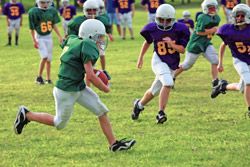 There are two types of brain damage that can be caused by contact sports – traumatic brain injuries (TBI),
including concussions, and chronic traumatic encephalopathy (CTE). A concussion is the common term for a hit,
jolt, or blow to the brain. CTE is a progressive degenerative disease affecting people who have sustained
repeated brain trauma, in which people can sustain CTE with or without a history of concussions.
There are two types of brain damage that can be caused by contact sports – traumatic brain injuries (TBI),
including concussions, and chronic traumatic encephalopathy (CTE). A concussion is the common term for a hit,
jolt, or blow to the brain. CTE is a progressive degenerative disease affecting people who have sustained
repeated brain trauma, in which people can sustain CTE with or without a history of concussions.
A figure that may open eyes is that a high school lineman receives between 1,500 and 1,800 sub-concussive hits each season. High school athletes are taught to play through sprained ankles, broken fingers, and pulled hip flexors; they are conditioned to play with pain. Why would a headache be a concern? Because that "headache" may be one of several symptoms that could be part of their "silent" brain injury. And football is not the only sport whose athletes are at risk for brain injuries. Brain injuries have the highest rate of occurrence in the following sports: rugby, hockey, football, lacrosse, soccer, wrestling, basketball, baseball, cheerleading, and volleyball.
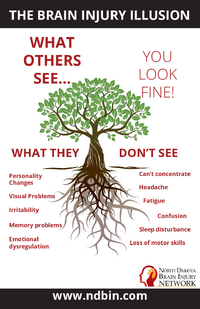 At the North Dakota Brain Injury Network (NDBIN), we often reference the brain injury illusion where the
student may look completely fine and normal, but underneath, they may be experiencing symptoms that an outsider
may not physically see – including headaches, fatigue, visual problems, concentration and memory problems,
emotional dysregulation, personality changes, sleep disturbances, irritability, and loss of motor skills.
At the North Dakota Brain Injury Network (NDBIN), we often reference the brain injury illusion where the
student may look completely fine and normal, but underneath, they may be experiencing symptoms that an outsider
may not physically see – including headaches, fatigue, visual problems, concentration and memory problems,
emotional dysregulation, personality changes, sleep disturbances, irritability, and loss of motor skills.
It's important for students to report their symptoms. And parents, coaches, and trainers need to encourage kids to report them. Roughly 85% of people who sustain a mild TBI/concussion will recover back to 100%. This is a large chunk of students who may not need the expertise of a brain injury specialist and the general management of concussions in schools and universities may be enough for them. However, for the 15% of students who may suffer longer lasting effects of their concussion, it’s critical for them to get specialized care from a provider who is experienced with brain injury care.
Several years ago, NDBIN modified the REAP (Reduce, Education, Accommodate, Pace) Concussion Management guide to North Dakota. This helpful guide can be a great resource for individuals that have sustained a concussion and are returning to play and learn.
Do you have someone that could benefit from working with a brain injury specialist? Reach out to a NDBIN resource facilitator to help find you one today.
2024 Virtual Concussion Symposium
 September 13
September 13
9:00 am – 4:30 pm Central
NDBIN’s Virtual Concussion Symposium is quickly approaching on September 13. This is our annual fall conference that is completely virtual and FREE! Additionally, the following professions can register for free CEUs: licensed addiction counseling, nursing, occupational therapy, physical therapy, psychology, social work, and speech-language pathology.
Presentations for this year’s symposium include:
-
Moving Forward with Concussion
Nancy Greenwald, MD -
Concussion and Youth Suicide Risk
Shivana Naidoo, MD -
Feasibility and Preliminary Effectiveness of an Online LoveYourBrain Meditation Intervention in
Young Adults with Concussion
Kyla Pearce, MPH, PhD, CBIS, E-RYT -
Intimate Partner Violence and Brain Injury
Sarah Ring, MS CCC-SLP, CBIST -
Executive Functions Deconstructed – Part 4: Judgment
Nan Kennelly, MS CCC-SLP, CBIST; Heidi Fiskness, MS CCC-SLP, CBIS; and Megan Dooley, OTR, CBIS -
Maximizing Neurological Rehabilitation
Michael Hennes, DC, DACNB, CBIS
Book Club
 Wednesdays starting September 25
Wednesdays starting September 25
9:30 – 11:30 am Central
Edgewood 55+
Grand Forks, North Dakota
Carly Endres, senior project coordinator with NDBIN, is starting a brain injury book club on September 25 which will run Wednesdays through December. Attend when you are able. This session's book in called The Boy in the Striped Pajamas.
This book club is helpful for:
Survivors: Great way to build up social skills, meet new people, and learn something new in the process. You may also find reading can help increase your attention in other areas.
Participants will read 25-30 pages weekly before attending book club and then during book club engage in word work, word games, socialization, snacks, etc. This will be done with the support of a Certified Brain Injury Specialist and volunteer students in the fields of social work, occupational therapy, speech therapy, and physical therapy. Paperbacks with the text will be available to all participants.
Caregivers: Opportunity to meet others caring for a survivor of brain injury or enjoy some time to yourself!
This book club is limited to 10 survivors of brain injury.
BE FAST for Stroke
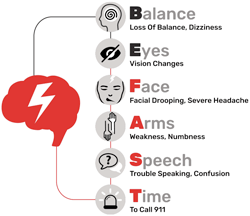 Be prepared to recognize stroke and take immediate action! Waiting to see if the symptoms go away is not an
option. The brain is under attack every second of a stroke. Your immediate action can have a lasting impact.
Be prepared to recognize stroke and take immediate action! Waiting to see if the symptoms go away is not an
option. The brain is under attack every second of a stroke. Your immediate action can have a lasting impact.
Books, Blankets, and Hot Dish
Two of our NDBIN staff were highlighted in the Summer Issue of North Dakota Medicine. Read the article reprint on the Center for Rural Health's Focus on Rural Health publication.
Webinar Wednesdays

These FREE webinars are designed to meet your needs whether you are a brain injury survivor, caregiver, or professional. Continuing education units (CEUs) are available for social work. Some upcoming webinars include:
- September 18 – Your Story Is Your Superpower
- October 2, 16, 30 – The Rancho Los Amigos Scale of Cognitive Recovery: A Guide to Understanding and Managing Recovery After Brain Injury (three-part series)
- November 13 – Finding Your Place: Overcoming Barriers in Rental Housing
Grand Forks Herald Highlights Nonprofits
In the July 27 issue of the Grand Forks Herald, NDBIN was highlighted as a nonprofit organization. NDBIN submitted an article and an ad.
Article: NDBIN Helps Everyone
One in eight people living in the U.S. are living with a history of a brain injury – ranging from mild (concussions) to severe injuries. But the impacts of a brain injury affect far more people than just the injured. Family members, caregivers, friends, employers, coworkers, and providers often have questions about how they can best support or assist the person who experienced the brain injury.
NDBIN has resources and information to support all of these people, including the person who experienced the injury, free of charge.
Education Conferences
NDBIN facilitates two annual conferences. The Virtual Concussion Symposium hosts presenters that can speak to new research and best practices those who have sustained a concussion or a mild traumatic brain injury. The Mind Matters Conference is a two-day conference with state, regional, and even national presenters who highlight new research, trends, practice strategies, and collaborative models of care.
Training Opportunities
The Webinar Wednesdays program began as a way to offer free webinars designed to meet needs of brain injury/stroke survivors, caregivers, and providers, and to reach rural audiences that may not have access to professionals in their community. Hundreds of webinars have taken place and the recordings are available. Webinars for 2025 are currently being scheduled.
Other trainings are available throughout the year and include:
- Certified Brain Injury Specialist training
- Direct Service Provider training
- Brain Injury Basics training
- Powerful Tools for Caregivers training
There are also support groups meeting across North Dakota that offer much needed support and guidance.
Contact Us
Contact us today to find out more about brain injury prevention, how to recognize a brain injury, and tools for survivors. We can be reached by phone at (855) 866-1884, by email at info@ndbin.org, or visit our website at ndbin.org.
